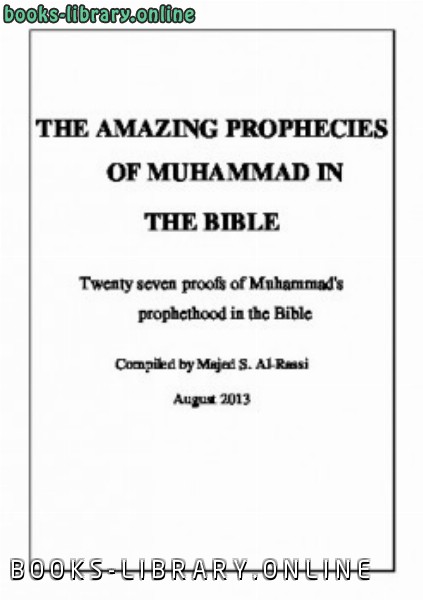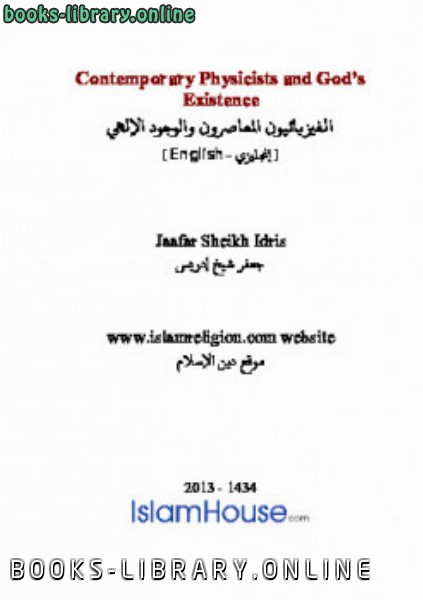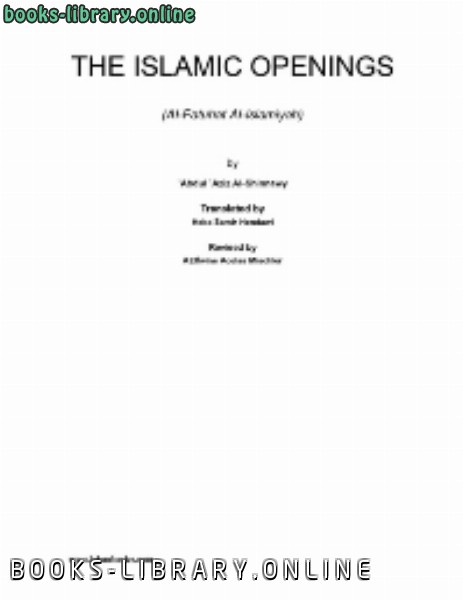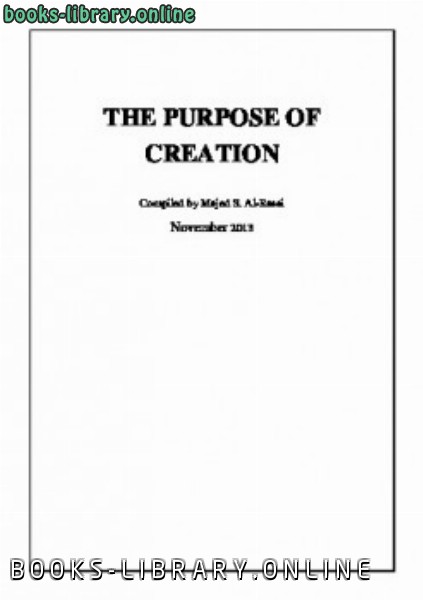كتاب THE ISLAMIC OPENINGS
تتناول هذه الكتب الأحداث التاريخية للفتحات الإسلامية التي من خلالها وصلت كلمة الإسلام إلى العالم بأسره. إنه يمثل الموقف الإسلامي الحقيقي خلال الحرب ، والنوايا الحقيقية لتلك الفتحات.عبد العزيز محمد الشناوي - عبد العزيز محمد الشناوي(1329 ـ 1406هـ/1911 ـ 1986م)مؤرخ، أكاديمي.حصل على دبلوم معهد التربية العالي بالقاهرة، شغل وظيفة أستاذ كرسي التاريخ في كلية اللغة العربية بالأزهر بعد حصوله علىالدكتوراه من جامعة الإسكندرية عام 1953 م. الوحيد بين أساتذة التاريخ الذي حظي بتكريم الدولة. شغل العديد من المراكز العلمية، فكان عضواً بلجنة التاريخ والآثار بالمجلس الأعلى للثقافة (1969 ـ 1985م)، وعضواً باللجنة العلمية الدائمة لترقيات أساتذة التاريخ في جامعة الأزهر وفروعها، وغيرها.من مؤلفاته: الأزهر جامعاً وجامعة.ـ الأزهر في مقاومة الاحتلال الفرنسي لمصر.❰ له مجموعة من الإنجازات والمؤلفات أبرزها ❞ الدولة العثمانية دولة إسلامية مفترى عليها جزء1 ❝ ❞ Muhammad the Last Messenger the Last Message ❝ ❞ السخرة في حفر قناة السويس لـ دكتور ❝ ❞ صور من دور الأزهر في مقاومة الاحتلال الفرنسي أواخر القرن 18 ❝ ❞ THE ISLAMIC OPENINGS ❝ ❞ سلسلة أعلام العرب ( عمر مكرم بطل المقاومة الشعبية ) ❝ الناشرين : ❞ الهيئة المصرية العامة للكتاب ❝ ❞ موقع دار الإسلام ❝ ❞ مكتبة الأنجلو المصرية ❝ ❞ دار الكاتب العربي ❝ ❞ مطبعه دار الكتب-بيروت ❝ ❱
من كتب اسلامية باللغة الانجليزية كتب إسلامية بلغات أخرى - مكتبة كتب إسلامية.

قراءة كتاب THE ISLAMIC OPENINGS أونلاين
معلومات عن كتاب THE ISLAMIC OPENINGS:
للكاتب/المؤلف : عبد العزيز محمد الشناوي .
دار النشر : موقع دار الإسلام .
عدد مرات التحميل : 6783 مرّة / مرات.
تم اضافته في : الثلاثاء , 26 مارس 2019م.
حجم الكتاب عند التحميل : 374.6 كيلوبايت .
تعليقات ومناقشات حول الكتاب:
THE ISLAMIC OPENINGS
Notes on the Translation............................................
The Opening of Makkah .............................................
The Opening of Iraq....................................................
The Opening of Al-Mada'in.........................................
The Opening of Al-Sham ............................................
The Opening of Jerusalem.........................................
The Opening of Egypt.................................................
The Opening of Alexandria ........................................
The Opening of Persia................................................
The Opening of Iraq 2.................................................
The Opening of Khurasan ..........................................
The Opening of North Africa ......................................
The Opening of Cyprus... ...........................................
The Opening of Constantinople.................................
The Opening of Andalusia..........................................
References..................................................................
We have rejected the traditional translation of fataha as "conquered" in
favor of "opened". Thus the English title of this book is The Islamic
Openings rather than The Islamic Conquests. In the military context, fataha
is usually applied only to the actions of the Muslims in bringing Islamic rule
to other lands. They opened those lands to Islam, inviting but not forcing
the native people to join Islam. But when other powers conquered other
nations, they did not open them, and another verb in Arabic is used for
their conquests.
Jizyah was imposed on every non-Muslim who kept his religion. It was
taken as a payment for protecting the city or country. The amount was
assigned according to the financial status of the people, and it was not
collected from young children, women, old men or the poor.
This book contains many place names and personal names that are
unfamiliar to the modern reader. Arabic does not write the vowels, thus
making transliteration of these names difficult. Most of these names are
not Arabic, so the translator cannot use Arabic morphology to determine
the vowels. We have attempted to find these names in other books with
limited success. Where possible, the English form of the name is used if it
is likely to be familiar to the reader, but in most cases the place names
herein are uncertain.
A simplified spelling for Arabic names is used throughout and the long
vowels are not indicated. The character ’ represents the Arabic hamza and
represents the Arabic 'ain.
The character ~ is to represent the Arabic words Salla Allahu 'alaihi wa
sallam meaning "Blessings and peace of Allah be upon him."
 مهلاً !
مهلاً !قبل تحميل الكتاب .. يجب ان يتوفر لديكم برنامج تشغيل وقراءة ملفات pdf
يمكن تحميلة من هنا 'تحميل البرنامج'

نوع الكتاب : pdf.
اذا اعجبك الكتاب فضلاً اضغط على أعجبني و يمكنك تحميله من هنا:


كتب اخرى في كتب اسلامية باللغة الانجليزية

A Study on Ablution Bathing Dry Ablution Tayammum and Prayer PDF
قراءة و تحميل كتاب A Study on Ablution Bathing Dry Ablution Tayammum and Prayer PDF مجانا

THE AMAZING PROPHECIES OF MUHAMMAD IN THE BIBLE PDF
قراءة و تحميل كتاب THE AMAZING PROPHECIES OF MUHAMMAD IN THE BIBLE PDF مجانا

Ash Shafi rsquo i rsquo s Risala: Treatise on the Foundations of Islamic Jurisprudence PDF
قراءة و تحميل كتاب Ash Shafi rsquo i rsquo s Risala: Treatise on the Foundations of Islamic Jurisprudence PDF مجانا

Contemporary Physicists and God rsquo s Existence PDF
قراءة و تحميل كتاب Contemporary Physicists and God rsquo s Existence PDF مجانا




